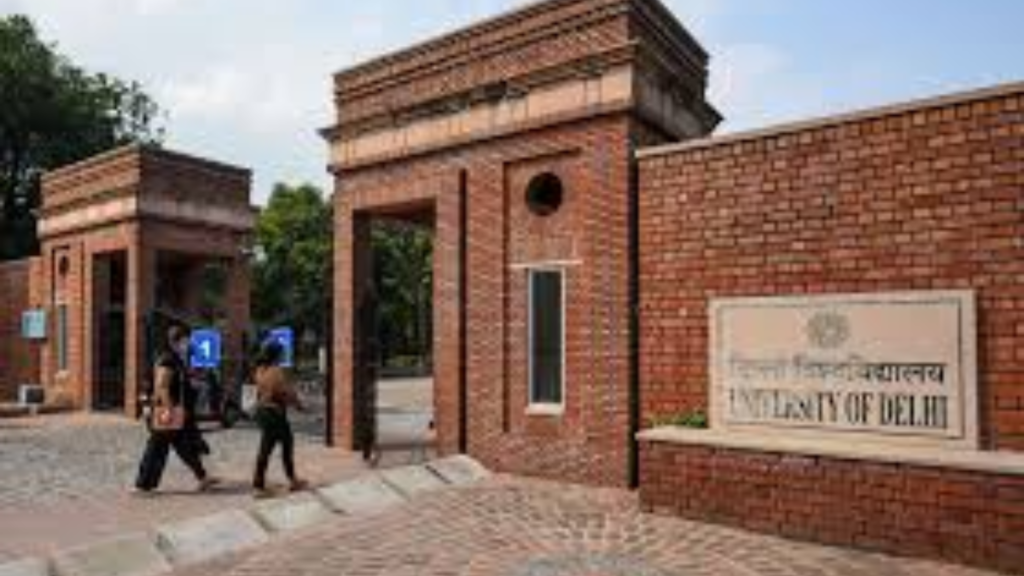Delhi University has approved a new master’s degree in journalism taught in Hindi as part of a significant effort to promote regional language instruction and enhance academic diversity in the nation. The university’s Standing Committee on Academic Matters has approved the new curriculum, which will be implemented under the Department of Hindi under the Faculty of Arts. Subject to approval by the Academic Council, the program is scheduled to begin in the 2025–2026 school year.
The announcement coincides with celebrations of Hindi Journalism Day, celebrated every year on May 30, the day the Udant Martand journal was published in 1826 as the first Hindi-language newspaper. The day is a landmark in Indian media history, celebrating the watchdog role journalism has in democracy. In establishing this postgraduate course in Hindi journalism, Delhi University honors the growth of vernacular journalism while also meeting the increasing need for higher academic education in the discipline.
This program is also a part of the university’s larger effort to democratize professional education, particularly for Hindi-speaking students. With English dominating the higher education system, students from many of these groups encounter language barriers that can hinder their professional and academic development. By offering this course in Hindi, the university aims to fill this gap, promote inclusiveness, and offer equal opportunities to budding journalists who are stronger in Hindi.
Curriculum and Framework
The newly-adopted master’s programme has been planned in line with Delhi University’s revised Postgraduate Curriculum Framework to ensure that it conforms to national academic standards and emerging industry requirements. The curriculum will combine theoretical and practical aspects of journalism with study areas like media ethics, investigative reporting, digital journalism, political reporting, laws governing media, and Hindi language editing. The students will also get exposure to multimedia reporting, social media planning, and broadcasting to provide a well-rounded understanding of contemporary journalism processes.
Besides the normal classroom training, the course is likely to incorporate internships, field reporting tasks, and guest sessions by professionals. These components will assist the students in developing practical experience and equip them for various positions in print media, digital media, and broadcast journalism.
English-Medium Counterpart and Future Plans
Even as the Hindi-medium journalism course is to be instituted in the 2025–26 academic session, committee members also announced an English-medium variant under the Department of English in the next academic year (2026–27). This expansion is indicative of the university’s acknowledgment of increasing calls for specialized journalism education in more languages and its commitment to producing bilingual or multilingual media professionals that can work across varied environments.
Committee Considerations and More Comprehensive Curriculum Reforms
The announcement of the new postgraduate programme was one of a group of agenda items discussed at the meeting held on Friday that dealt with the examination and approval of syllabi for both undergraduate and postgraduate programmes. They are part of broader efforts to overhaul academic programmes according to the Undergraduate Curriculum Framework (UGCF) and the Postgraduate Curriculum Framework, both of which mirror reforms mooted under the National Education Policy (NEP) 2020.
Highlights of the review by the committee were the clearance of syllabi for the seventh and eighth semesters of BA programmes in subjects like education, Hindustani music (both programme and honours streams), and geography. These changes are meant to update content, foster interdisciplinarity, and provide students with greater freedom to choose courses.
The committee also reviewed and revised postgraduate syllabi in several fields, such as philosophy, economics, geography, sociology, political science, and mathematics. These reforms aim at making academic content relevant and equipping students adequately for research, teaching, or employment in the public and private sectors.

Dissent and Governance
The committee sessions conducted on May 2, 6, and 8 formed the core of the syllabus deliberations. Although most alterations were finally adopted, some determinations did experience dissent among faculty members and committee members. Nevertheless, the Academic Council and Executive Council eventually approved most of these changes. This process reflects the dynamic academic governance within Delhi University, wherein intense debate and scrutiny are inherent components of policymaking and curriculum construction.
A Step Towards Empowerment Through Language
In its nod to the master’s course in journalism in Hindi, Delhi University has reiterated its position as a pathfinder institution dedicated to the development of regional languages and curriculum diversification. The initiative is poised to create fresh opportunities for Hindi-speaking area students and consolidate Hindi journalism in an era when local media continues to occupy a shaping role in public perception, information dissemination, and empowering the people.
If the Academic Council approves, admissions to the Hindi-medium journalism course could start as early as mid-2025 and could change the academic and media landscape for generations to come
Also Read :https://www.du.ac.in/
Also Read :https://thenewstudent.com/how-us-rules-on-international-students-could-hurt-the-economy/
Also Read :https://thenewstudent.com/find-your-raj-shala-darpan-class-5-result/